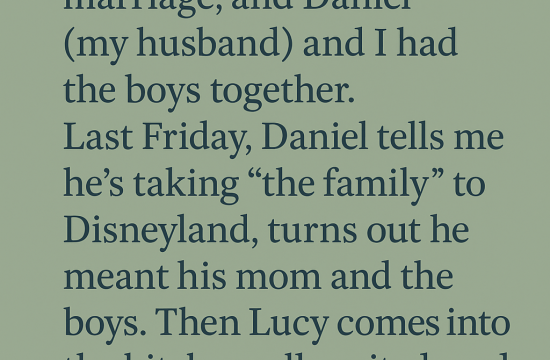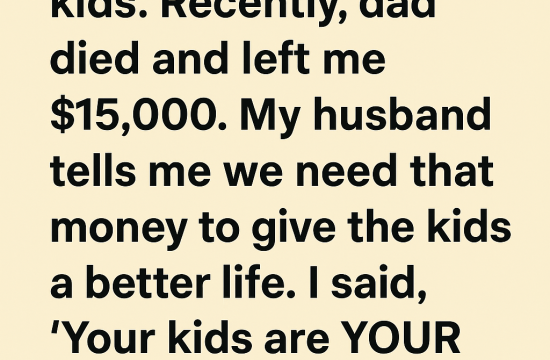The Girl Who Inherited More Than Money: How a Dying Child’s Compassion Redefined a Family’s Legacy
Mr. Lewis sat in his old leather recliner, the one that had weathered countless nights of paperwork, decisions, and silent reflection. At eighty-three, his body was frail, but his mind wandered through decades of triumphs, struggles, and sacrifices. He remembered arriving in the world with nothing but grit and leaving behind an empire that bore his name. Yet wealth was never the only thing that defined him.
He and his late wife had raised eight children—four biological, four adopted—while opening their doors to countless foster kids who had nowhere else to go. His wife would often chuckle warmly, “You always have room for one more, don’t you?” And he always did.
For decades, his life was filled with noise, chaos, and laughter. But as the years passed, the house grew quiet. His children grew up, scattered, and returned only when they needed something. His oldest son Richard came with thinly veiled requests for money. His daughter Olivia’s visits began with talk of mounting bills. Even his grandchildren treated him like an ATM, visiting out of obligation or during holidays when gifts were expected.
So when the doctor delivered the crushing verdict—one month left to live—Mr. Lewis accepted it with the calm dignity that had marked his life. That night, he called his children. Within hours, they came rushing in from every corner of the world, suddenly eager to play the roles of dutiful heirs. They hovered around him with exaggerated concern, offering cups of tea they hadn’t brewed and reassurances that rang hollow. Mr. Lewis, though, saw right through them.
And when he passed peacefully in his sleep, their pretenses dropped instantly. What remained was hunger—not for memories, but for inheritance.
At the will reading, the room buzzed with tension. Richard leaned toward Olivia with a smirk. “He always said I had the best head for business. Bet I get the most.”
Olivia shot back with narrowed eyes, “You wish. Dad always trusted me more.”
Their bickering stopped abruptly when the lawyer, Mr. Alaric, entered—with a young girl by his side. She couldn’t have been more than thirteen. Her presence was a puzzle that instantly soured the greedy anticipation in the room.
“Who is she?” Richard demanded.
“This,” Mr. Alaric said solemnly, “is Harper. She’s here because she is the sole heir of Mr. Lewis’s estate.”
The room exploded with outrage. Olivia’s voice cracked with fury: “This is insane! She’s not even family!”
But Mr. Alaric raised a hand and began to read Mr. Lewis’s final letter. The words silenced even the angriest voices.
“Dear family,
I know you are shocked, perhaps angry. But this decision was not made lightly. Harper is the little girl next door—the one who noticed when I was struggling. She stopped by every day, not for money or gifts, but simply to keep me company. She read to me, played cards, and made me laugh. While you were busy with your lives, she became my true family.”
The children shifted uncomfortably as Harper stared at the floor, her small fists clenched.
The letter continued, the lawyer’s voice steady but heavy:
“Harper herself carries a burden. A few months ago, she was diagnosed with a terminal illness. She may not have much more than a year or two. My fortune will grant her the chance to live fully—travel, laugh, taste joy. She gave me love with no strings attached. It is only right that I give her the same in return. I hope you will support her, not resent her, because she embodied what none of you did: genuine care.”
When the lawyer folded the letter, silence fell. For the first time in years, Richard and Olivia had nothing to say.
Then Harper, her voice trembling yet resolute, stepped forward. “Mr. Lewis was my friend. I didn’t want his money. I just wanted his stories, his jokes, his time. With what he’s left me, I’ll make memories with my parents. And when I’m gone, whatever is left will go to children like me—kids fighting for just a little more time.”
Tears streamed down Olivia’s face. Richard, struggling with guilt, whispered, “I’m sorry, Harper. I didn’t understand.”
Harper only smiled faintly. “Mr. Lewis did.”
In the months that followed, Harper lived as brightly as she could—riding horses, climbing the Eiffel Tower, eating ice cream for breakfast, and laughing louder than her illness could ever silence. When her time came, she passed peacefully, surrounded by her parents, leaving behind not just money but a legacy of compassion. Her donations built playgrounds at children’s hospitals, funded research, and gave countless families a chance at hope.
And for Mr. Lewis’s children, the inheritance they once craved became something far greater—a lesson. Harper and their father had shown them what true wealth was: love freely given, life lived fully, and kindness that outlives us all.











